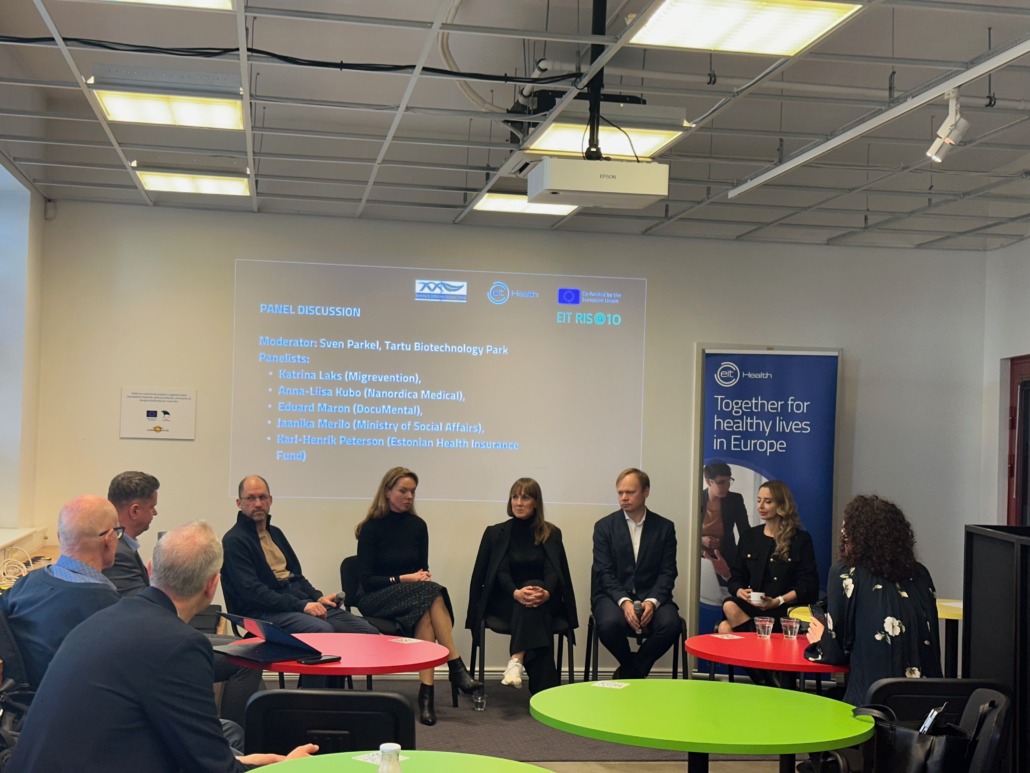“Shaping the Future of Healthcare: Key Insights from EIT Health’s 2nd Morning Health Talks in Tallinn”
The 2nd EIT Health Morning Health Talks, held on 19 November at the Tallinna Ettevõtlusinkubaator, provided a platform for healthcare innovators, policymakers, and entrepreneurs to discuss transformative solutions for the sector. Through thought- keynote, company showcases, and an engaging panel discussion, the event underscored the important role of technology, prevention, and patient-centric care in reshaping healthcare for the future.
Jan-Philipp Beck, Partner at Vintura, delivered an inspiring keynote on the transformative potential of medical innovation. While advancements have significantly improved life expectancy and reduced complications for diseases like type 2 diabetes, he highlighted pressing challenges, including low adherence to medications—50% of patients don’t follow treatment plans, leading to €125 billion in healthcare costs and 200,000 deaths annually in Europe.
Key factors affecting adherence include complex treatment regimens, side effects, and psychosocial barriers. Beck called for solutions that go beyond simple medication reminders, advocating for the integration of dynamic, AI-powered virtual health assistants that adapt to patients’ routines and needs.
In addition, Beck stressed the importance of shifting focus to prevention, screening, and early detection, emphasizing the role of behavioural and lifestyle changes, as well as leveraging diagnostic tools and pharmaceutical interventions to combat chronic diseases earlier.
Company Presentations:
Katrina Laks, Migrevention: Migrevention offers a holistic, evidence-based digital headache clinic addressing the lack of effective pathways for migraine care. Their digital tools aim to empower patients and specialists to manage primary headaches collaboratively. Clinical trials for diagnostic tools and therapeutic models are ongoing, with market launch planned for 2025.
Anna-Liisa Kubo, Nanordica Medical: Nanordica is pioneering first-in-class wound care products based on copper and silver technology, which simultaneously prevent infection and promote healing. Clinical trials show faster wound recovery compared to competitors, with market authorization expected in 2025.
Eduard Maron, DocuMental: DocuMental, the world’s first fully digital mental health clinic, has treated over 6,000 patients since 2022. It reduces patient waiting times (from months to days) and improves clinician efficiency by over 50%. DocuMental is now expanding to Ukraine to support locals and soldiers amidst the ongoing crisis.
 Panel Discussion: Transforming Healthcare Over the Next Decade
Panel Discussion: Transforming Healthcare Over the Next Decade
Moderated by Sven Parkel (Tartu Biotechnology Park), the panel explored the transformative potential of healthcare technologies in the coming years. Panelists included: Katrina Laks (Migrevention), Anna-Liisa Kubo (Nanordica Medical), Eduard Maron (DocuMental), Jaanika Merilo (Ministry of Social Affairs), Karl-Henrik Peterson (Estonian Health Insurance Fund)
Key Insights from the Discussion
- Data-Driven Innovation: Personalised, preventive, and predictive healthcare models powered by data and AI will be essential to improve outcomes and efficiency.
- Empowering Patients and Providers: Technology should act as an enabler, reducing bureaucracy while enhancing decision-making and patient engagement.
- Balancing Prevention and Treatment: While lifestyle changes remain critical, advancements like GLP-1 agonists (e.g., Ozempic) promise to manage conditions like obesity. However, long-term data is crucial before fully outsourcing health outcomes to pharmaceuticals.
